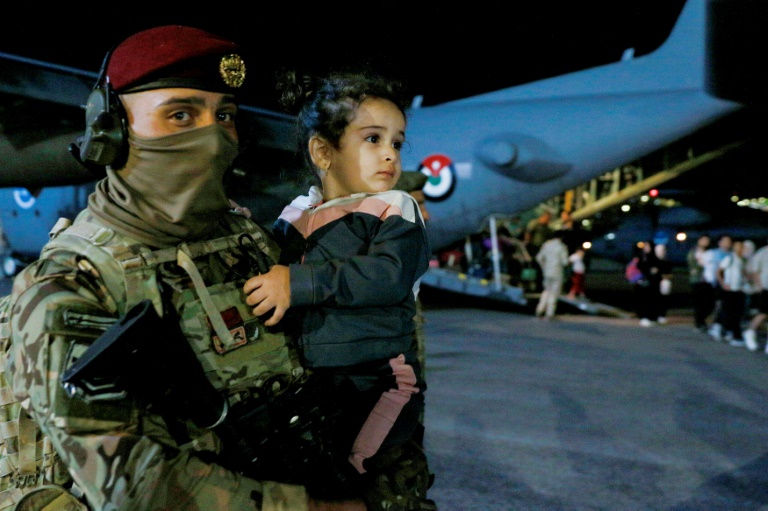
KHARTOUM - Foreign nations pushed on Monday with frantic evacuations of their citizens from chaos-torn Sudan, where heavy fighting raged for a 10th day between forces loyal to two rival generals.
As army and paramilitary forces again clashed in Khartoum and across the country, terrified Sudanese have endured acute shortages of water, food, medicines and fuel as well as power and internet blackouts, the UN said.
At least 427 people have been killed and more than 3,700 wounded, according to United Nations agencies, which also reported Sudanese civilians "fleeing areas affected by fighting, including to Chad, Egypt and South Sudan".
"Morgues are full, corpses litter the streets" and overwhelmed hospitals often have to stop operations for security reasons, said Dr Attiya Abdallah, head of the doctors' union.
The United States and multiple European, Middle Eastern, African and Asian nations have launched emergency missions to bring to safety their embassy staff and Sudan-based citizens by road, air and sea.
US special forces swooped in with Chinook helicopters Sunday to rescue diplomats and their dependents, while Britain launched a similar rescue mission involving more than 1,000 military personnel.
European Union foreign policy chief Josep Borrell said more than 1,000 of the bloc's citizens had been taken out during a "long and intense weekend" involving missions by France, Germany and other member nations.
With Khartoum international airport disabled after battles that left charred airplanes on the runways, many foreigners were airlifted out from smaller airstrips, many to nearby Djibouti.
Long convoys of UN cars and buses have made their way from the capital, where gunfire again echoed through the streets, to Port Sudan on the Red Sea coast, an arduous 850 kilometre (530 mile) road trip away.
"The war fell upon us all without warning," a Lebanese evacuee told AFPTV upon his arrival by bus to Port Sudan. "It was very, very sad for everyone, not just the foreigners -- most of all for the Sudanese people.
"The situation in Khartoum in very sad ... It's destroyed. I left with this T-shirt and these pyjamas, all that I have with me after 17 years."
- 'Weapons and narrow interests' -
The fighting started on April 15 in the already poverty-stricken African nation with a history of military coups, sparking fears of a deeper descent into bloodshed and a wider humanitarian crisis.
Across the capital city of five million, roaming army and paramilitary troops have fought ferocious street battles, with the sky often blackened by fires in bombed buildings and looted shops.
Life in war-torn Khartoum is "burdened with anxiety and exhaustion," said resident Tagreed Abdin, an architect.
"There was a rocket strike in our neighbourhood a few doors down from us ... It is like nowhere is safe."
The city has endured "more than a week of unspeakable destruction", said Norway's ambassador Endre Stiansen who was evacuated with his colleagues.
"It fills me with immense sadness that I had to leave so many Sudanese colleagues and friends behind," he said on Twitter. "I fear for their future, because at present weapons and narrow interests carry more weight than values and words."
Looking ahead at what fate awaits Sudan, already one of the world's poorest nations, he said that "most scenarios appear bad".
The fighting broke out on April 15 between forces loyal to army chief Abdel Fattah al-Burhan and his deputy turned rival Mohamed Hamdan Daglo, who commands the powerful paramilitary Rapid Support Forces (RSF).
The military toppled Bashir in April 2019 following mass citizen protests.
The two generals seized power in a 2021 coup, but later fell out in a bitter power struggle, most recently centred on the planned integration of the RSF into the regular army.
- Hospitals used as bases -
As foreigners who can get out flee the country, the growing impact of the violence on Sudan's already dire humanitarian situation worsens.
Five aid workers have been killed, said the UN's Office for the Coordination of Humanitarian Affairs (OCHA), and the UN World Food Programme (WFP) has been forced to suspend operations.
The health care system is close to collapse, with the World Health Organization (WHO) verifying 11 attacks on hospitals and clinics, some of which have been overrun by the rival forces and used as military bases.
In Nyala, in South Darfur, a compound of aid agency Doctors Without Borders was stormed, its medical warehouse raided and vehicles stolen, the UN said.
"The remaining facilities in Khartoum and Darfur states are stretched beyond capacity and nearly non-functional due to staff fatigue and lack of supplies," OCHA added in its latest update.
Also in Nyala, gunmen stormed a WFP compound seizing 10 vehicles and six food trucks.
"Warehouses in Nyala, South Darfur have been overrun and looted, with the loss of up to 4,000 metric tonnes of food", OCHA said.
The WHO said it had readied additional emergency medical supplies "such as blood bags, trauma and emergency health kits to meet the urgent health needs" as other supplies have been "rapidly consumed due to the heavy trauma load."
burs-fz/pjm